![]()
The Words of the Reinig Family
|
|
The Words of the Reinig Family |
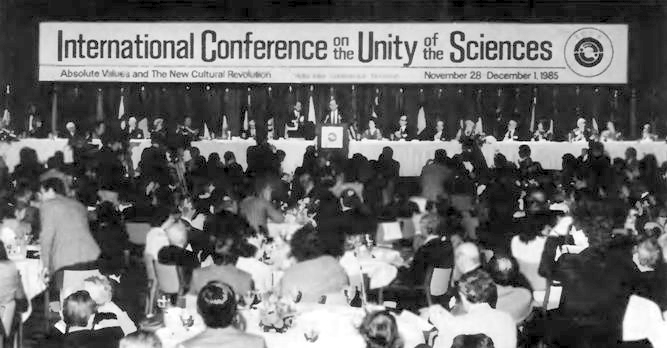
The City of Houston, Texas, was host this year to the fourteenth annual International Conference on the Unity of the Sciences, with approximately 240 scholars from 41 nations participating. ICUS XVI was significant in that it came at the very culmination of Father's victory after his 40-year period of public ministry and was his last conference in America before going to Korea to link all of his major activities with the fatherland.
Father created ICUS in 1972 with the conviction that science has the potential to bring about a new world order based on universal values. Each year he has brought scientists together under the themes of "Science and Values" and "Unity of Knowledge" to engage in an international, interdisciplinary dialogue that he hopes will contribute to the establishment of a unified, global ideology.
Father has never imposed his ideology on the scientists but gives them the liberty and the richest possible environment to delve into these areas and uncover universal concepts by themselves. Dr. Kenneth Mellanby, director emeritus of Monk's Wood Experimental Station in Huntingdon, England, and this year's, as well as last year's, conference chairman, said at a press conference:
"Although I am not a member of the church, I think Rev. Moon is a great man. I am particularly impressed by the complete academic freedom he insists on for the organizers and participants of the conference to express their views.... He wants to build the Kingdom of Heaven on earth. By allowing academics to come together in this way he is taking a step in the right direction"
At the opening plenary session, Father was warmly introduced by Dr. Alexander King, president of the Club of Rome in Paris, France, and one of the two vice chairman of the conference. Dr. King was quite obviously thrilled that Father was back with them after his incarceration, although he admitted he did feel "a lingering regret" that he would not be hearing Mother speak again this year.
Father then gave his Founder's Address, emphasizing strongly the need for a "new cultural revolution," that the time has come for scholars to put their ideals into action and to "stand up and actively assume the great mission for creating the world of new culture, which must be established at any cost. Exploration of absolute values cannot be meaningful for its own sake... the ideal world centered on absolute values must be concretely realized."
He also said he was "determined to offer an alternative to the existing attitudes of the news media:" and urged the scholars to help him by contributing articles to the new monthly magazine The World and I.
The ICF Founder's Award, which was last presented in 1982 and which carries a substantial cash prize, was then presented by Father to Dr. Friedrich August von Hayek, 86, a renowned political scientist and economist, who was awarded the Nobel Prize in Economics in 1974. Throughout his life and work Dr. Hayek has sought to provide a refutation of socialism, by stressing that innovation and progress depend on traditional institutions such as the family and the free market of goods and ideas.
Shortly before the conference Dr. Hayek was stricken ill with a bronchial infection and could not be present. His friend and biographer, Dr. William Bartley, was there to receive the award and also to read Hayek's plenary address on "The Presumption of Reason; which stated:
One should never suppose that our reason is in the highest critical position and that only those moral rules are valid which our reason endorses.... Culture has extended itself not only and not even principally because it rests on scientific insight.... [The] ethics of private property and the family, upheld by religion, have enabled us to form an order of human cooperation which far exceeds the possibilities of any rational control.
One of the committee chairmen called Dr. Hayek's talk "polemical and provocative; and it provided much fuel for the participants as they sought to find links between the disciplines based on reason and those based on values.
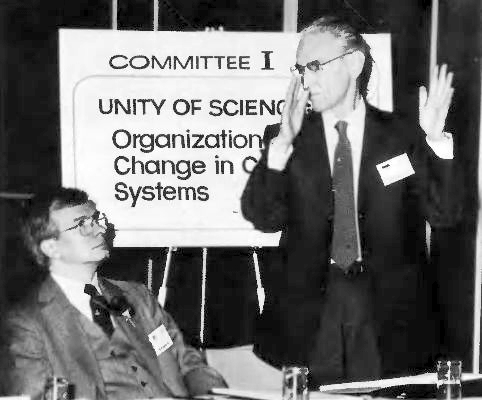
Dr.
Gerard Radnitzky makes a point in Committee I.
The committee topics were chosen very carefully by the conference organizers. Committee I, entitled "Unity of Science: Organization and Change in Complex Systems:' was chaired by Dr. Marcelo Alonso, executive director of the Florida Institute of Technology. James Baughman, executive director of ICUS, explained the issues this group handled: "The way Alonso expressed the unity of all the disciplines was to say that there are certain common concepts about how things change and are ordered. Very principled -- Chapter One. He's working on the key to the unity of the sciences. It's a very significant field" Some of the papers presented were entitled: "Gravitation and the Origin of Large Structure in the Universe," and "Mind: Mapping and Reconstruction of Reality."
Committee II, "Synthesis and Relationships in Culture," was chaired by Dr. Vincenzo Cappelletti of the Italian Encyclopedia Institute in Rome. "It is a very important concept," said Baughman. "How can you create a unity of cultures without losing the elements that make them what they are? Does cultural synthesis necessarily mean a loss of culture, a loss or a reduction of creative elements? It's a question that we ask in our own church. You can talk about it from a scientific, a sociological, a psychological, and an economic point of view. It's an amazing topic. It's something that I think needs to be addressed even more. Some of the topics discussed were: "Peace as a Project of Interracial Synthesis': and "The Concept of Evolution as a Synthetic Tool in Science: Its Strength and Limits."
Every year Father has wanted one of the committees to discuss the relationship between science and spirit, and this was handled in Committee III, "Forms and Symbols: The Root of Behavior': led by Dr. Jean Charon, a French theoretical physicist who led the same committee last year. Charon writes, "When perceived from the outside, the universe appears as forms in motion (forms of space-time according to physics). But when represented deep in its structure the universe appears as made of symbols connected together through (generally) logical relations." This corresponds exactly to the relationship explained in the Principle between internal character and external form. Questions were raised in this committee as to whether symbols exist and are as relevant to human life as objective reality. Some topics: "The Roots of Behavior in Contemporary Physics': and "Paris, Ark on the Sea of Time: Modern City, World without Memory."
Committee IV addressed the issue of "Modernization, Appropriate Values and Education": and was headed by Dr. John Oxenham of the University of Sussex in Sussex, England. The committee sought to address such questions as, What is the content of our education? How can we begin to teach global consciousness to our next generation? Has the emphasis on modernization led to the weakening of the moral values, and if so, how might that balance be regained? Some of the paper titles: "Modernization and Education of Young Children in Poor Developing Countries," and "Modernization and Life-Long Education:'
"The Search for a Unifying Global Philosophy' the theme of Committee V, is a key topic in every ICUS. The organizing chairman was Dr. A. Durwood Foster, a professor of Christian theology in Berkeley, California. The papers touched on aspects of the philosophies of many thinkers -- such as Plato, Kant. Nietzsche, Sri Aurobindo, Teilhard de Chardin, Heidegger, and Sun Myung Moon -- which were vigorously evaluated in the inquiry into the possibility and even the desirability of a unified system of thought. There was much lively debate, including one scholar's idea to make up a new philosophy rather than adopting an already existing one. Dr. Huston Smith, honorary chairman of the committee, offered a wise note at the end. "The more deeply you go into your own particular faith or philosophy, then you will see the affinity of all faiths!' He said it should be our aim to search within the truths we know, "rather than posing or teasing out a global philosophy!"
Committee VI was uniquely suited to the city of Houston, home of the NASA Space Center, as it dealt with "The Universe and Its Origin from Ancient Myth to Present Reality and Fantasy' Papers covered the up-coming manned exploration of Mars, the reality of UFO's, comets, astrology, the truth of the "big bang" theory, and the search for extraterrestrial life. It was chaired by Dr. S. Fred Singer, a biology professor in Fairfax, Virginia, who feels that the study of the physical universe provokes the search for the deeper meaning of life itself. In the words of one of the paper writers, Brian O'Leary, "The forthcoming space renaissance is a metaphor for human transcendence."
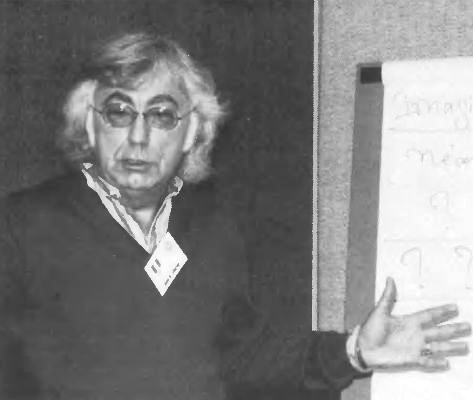
Dr.
Jean Charon discusses the imaginary and the real in Committee III.
On Friday night, the IRF officers, the ICUS chairmen, the senior consultants, and their wives -- those who have been loyally supporting ICUS for many years were invited by True Parents for an intimate dinner together. Father surprised them by asking each of the professors to contribute a song. When Father and Mother, In Jin Nim, and Hyun Jin Nim also sang for their guests, a very warm, personal, family atmosphere was created. Father spoke to them sincerely about how his work in America is culminating and how he hopes that the scholars will really stand behind him and take responsibility to concretely carry out his vision in the years ahead.
A second plenary address was given on Saturday by Dr. Alexander King on "Multidisciplinary Perspectives on World Problems: The Great Transition" The paper dealt with the question of how science is to deal with the serious problems facing the post-industrial or information society of the near future, such as the overpopulation of cities, the use of robots, and the danger of alienation. He said:
"The paramount need of our times is seen by many not as a need for more and better science and improved technology, but for new ethical guidelines and moral values on which individuals and governments can operate. But can science contribute to the shaping of values?... There seems to be a real possibility that science...could form a basis for the determination of the values needed for survival and human development!"
On Saturday afternoon, the wives and children of the ICUS participants had the unique opportunity to take a tour of the NASA Space Center at the same time the space shuttle was in orbit over the earth.
Everyone could browse daily through the participants' published books and Paragon House publications in the Exhibit Hall and walk through a photographic display of 13 years of ICUS' history.
Cards were available to be filled out in order for the participants to receive a one year's free subscription to Insight magazine, the new weekly newsmagazine published under the auspices of The Washington Times.
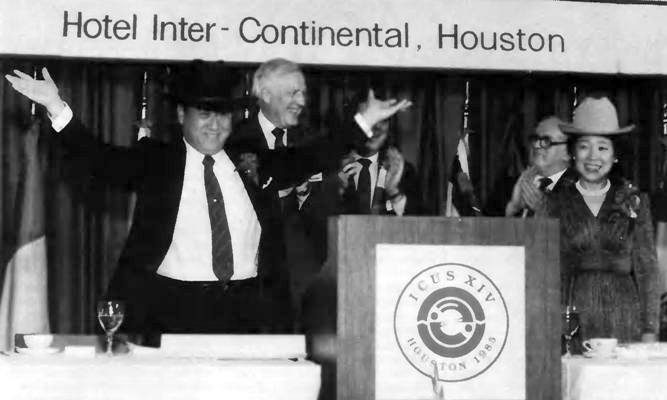
At the closing plenary session on Sunday, to sum up the proceedings, Dr. King explained that although he found it "difficult to go straight into an assessment of the totality, especially in view of the enormous variety of topics under discussion': the search for clarity should be of utmost importance for the sake of the future success of the ICUS work. He expressed the need to popularize science, to explain new concepts in a "sufficiently simple" way so that "mathematicians can understand what biologists are getting at and biologists what physicists are hinting at.... I think it's essential that we aim at writing with a clarity which enables this kind of transfer to take place. This, I think, has been largely successful at this meeting."
Dr. Tor Ragnar Gerholm, professor of physics at the University of Stockholm, Sweden, and also vice-chairman of the conference, said in his closing remarks:
"We have yet to make a determined conscious effort to get a better understanding of these evasive problems of science and values.... If progress is at all possible...and I believe it is, it is only through ICUS. This is true because ICUS offers the one and only truly international, interdisciplinary forum for scientific exchange of ideas on science and values.... Science is the strongest force for social change ever known to us.... As I see it, it is not impossible after all that science indeed is the means to bring about what Rev. Moon refers to in that intriguing phrase, "The New Cultural Revolution."
At the Farewell Banquet, Father offered his closing remarks, spiced with wit as usual.
"ICUS was one of our first international projects." Father said, "and I will always remember it...like a first love. It is very dear to my heart." He also said that this year's conference marked the beginning of a new era: "We are moving forward into a new challenge lying just ahead. We have more confidence than ever in the purpose and tradition of ICUS."
After his speech Dr. Mellanby presented Father with a proclamation of thanks from the ICUS participants and then Dr. King and Dr. Gerholm came up quietly behind Father and Mother and surprised them each with a Texas-style cowboy hat amid great cheering and applause. Father heartily embraced all the guests at the head table with love and a beaming smile.
Next year's ICUS will take place in Washington DC.
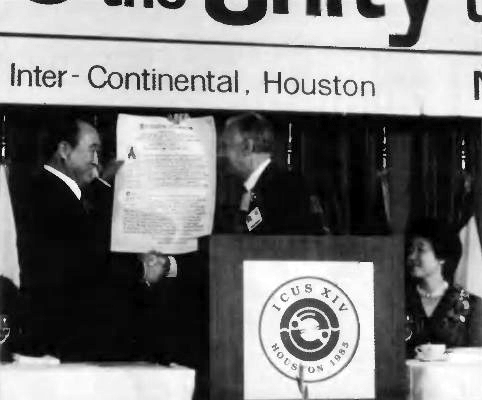
At
the closing banquet, Dr. Kenneth Mellanby, chairman of ICUS XIV,
presents the Houston Declaration, a statement of gratitude, to
Father.
As we gather for this Fourteenth ICUS meeting in Houston, Texas, we wish to extend our heartfelt appreciation to the Reverend Sun Myung Moon for the generous support and truly remarkable inspiration which he has provided for this distinguished conference series. We are especially pleased to have him with us this year, realizing that he was prevented from being with us for the 1984 ICUS in Washington DC due to unfortunate and distressing circumstances. We missed him and sincerely regret that he was faced with such difficult, undeserved persecution, and we celebrate the fact that he has clearly risen above that challenge.
On the occasion of the Founder's return to ICUS XIV in Houston, we want to express our support and appreciation for his vision which includes not only an affirmation of open academic inquiry into matters of value and truth, but also a call for responsible action in an attempt to solve global and life-threatening problems. We share this ideal and, in keeping with our ICUS themes, we agree with his conviction, as expressed in the Founder's Address, that "today, the world should change," and that "humankind should now leap forward." As the "ICUS family" we support Rev. Moon in this quest, and join him in seeking to bring about sound solutions to serious world problems.
ICUS XIV Executive Committee